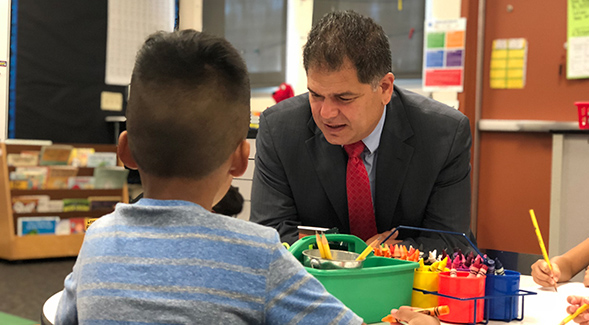Francisco Escobedo to Lead SDSU's Efforts to Transform Urban Schools
The alumnus is superintendent of the high-achieving Chula Vista Elementary School District.

“It's so important for urban schools to integrate a social-emotional type of teaching, and to have a safe and nurturing environment.”
Three decades have passed, but Francisco Escobedo remembers that afternoon like it was yesterday. He remembers slapping steel handcuffs on the wrists of a boy, no more than 16 years old. Most of all, he remembers the look in his eyes.
It was at the height of the crack cocaine epidemic of the 1980s, and the kid was clearly high — but there was something else. Something more haunting.
“It was almost hollow,” Escobedo recalls. “Devoid of hope."
Then a young officer with the San Diego Police Department, Escobedo tried reasoning with his young prisoner as the squad car rolled across town, bound for lockup. “You need to get out of this life,” Escobedo pleaded with him. “You need to go back to school.” After a couple minutes of listening to the unsuccessful intervention, his partner had heard enough.
"Hey, you're wasting your time,” the other officer snapped. “Once they're in the system, they don't come out. If you really want to make a difference, go back to school and get a teaching credential."
Escobedo was listening. He resigned from the force a week later to embark on a career as a teacher, principal and — for the past 10 years — the transformational superintendent of the high-achieving Chula Vista Elementary School District.
"When I go into classrooms and I see students of color, I would think about the moments I would drive young people to jail,” he said. “I say, 'That's not going to happen to these kids.’ We have the power and knowledge to make a difference.”
Escobedo is now coming to San Diego State University, seeking to make that same difference, only on a national level. He has been named the new executive director of SDSU’s National Center for Urban School Transformation (NCUST), effective Sept. 1. Escobedo will succeed founding executive director Joseph F. Johnson, Jr., who is retiring from the role after 16 years.
"It's hard to imagine a better choice for NCUST than Francisco Escobedo," said Johnson, who will stay on with NCUST on a part-time basis as an executive coach. "To put it succinctly, he gets it. He believes that we can create schools where all demographic groups of students achieve at high levels of success. Schools where they can be taught in a way that makes them love learning."
Appreciative inquiry
Founded in 2005, NCUST was created to play a constructive leadership role around urban education nationwide. The center uses a research approach called “appreciative inquiry,” focusing on success stories rather than problems.
Each year, NCUST identifies urban schools without selective admissions that serve low-income communities, yet achieve tangible, positive results for all the demographic groups they serve. The center also partners with schools and school districts to offer insight and support to help them achieve similar outcomes.
"Dr. Joe Johnson is someone I've admired for many years, and I'm going to be learning from him and listening,” Escobedo said. “I'm excited to become part of that culture and continue on with the excellence that he has established — and add a few things as well."
Escobedo is hardly a new face to SDSU. He earned his administrative credential, master’s degree and Ed.D. in educational leadership at the university, and he has taught courses in the Department of Educational Leadership since 2001. He’s long been on NCUST’s radar, as well.
"We've identified 167 schools across the county that are success stories and eight of those are in the Chula Vista Elementary School District — more than any district in California,” Johnson said. “That doesn't happen by accident. It's the superintendent's leadership that is powerful in creating that district-wide culture, expectation of leadership, and support."
Driving a success story
A 2019 study by the Learning Policy Institute named Chula Vista Elementary School District (CVESD) a “Positive Outlier” — a district where students were beating the odds in the face of socioeconomic conditions in their community.
“We made Chula Vista a place where students love to come,” Escobedo said. “However, we also have very rigorous standards for our students to meet.”
He did so by creating systemic communication and collaboration within the district between administrators, unions, principals, parents and the district office. He notes that he personally visits every school twice a year and drops in on every classroom.
Escobedo is also particularly proud of investing in the arts. Under his watch, CVESD hired more than 80 visual and performing arts teachers and began a partnership with San Diego Youth Symphony and Conservatory that has caused program participation among South Bay youth to skyrocket.
But his first order of business, he said, has been creating a safe environment for learning. That’s a lesson gleaned growing up as the son of immigrant parents in Manhattan’s Washington Heights neighborhood in the 1960s and 1970s — a time when New York City was known as the murder capital of the world.
"Being in a constant fight or flight response can really inhibit your learning and your ability to be inquisitive,” Escobedo said. “It's so important for urban schools to integrate a social-emotional type of teaching, and to have a safe and nurturing environment."
As he prepares to take over NCUST, Escobedo is excited to share what worked in his district, while also casting a spotlight on innovative practices that are working elsewhere.
"There's a lot of potential for transforming education nationally and there's so much that’s needed, especially as we are entering a post pandemic environment,” he said. “I think SDSU can be a beacon for the rest of the country."



